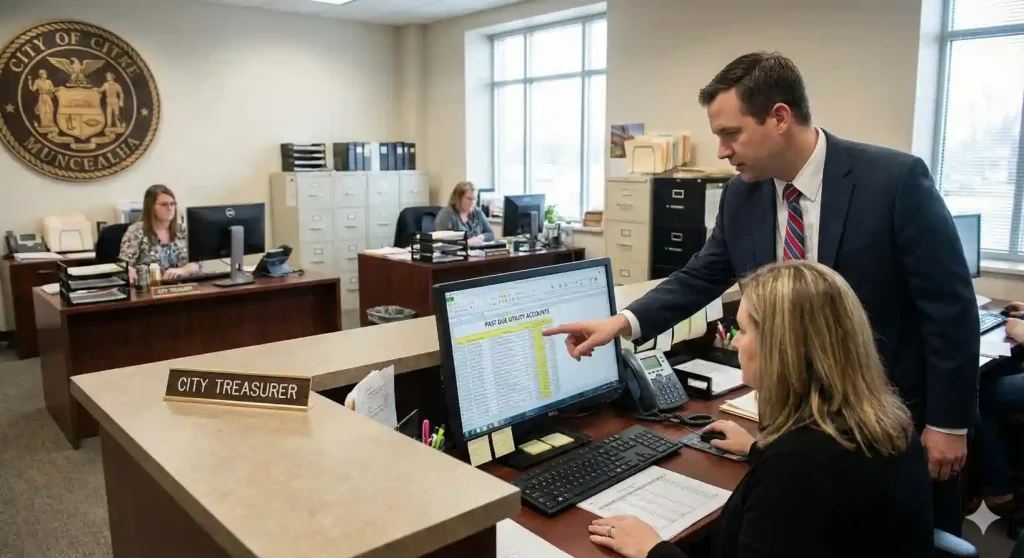The Mayor’s Shield: Diplomatic Revenue Recovery for the Public Sector
Recover lost municipal revenue without burdening your taxpayers. We act as a respectful extension of your municipality, recovering utility bills, EMS fees, and miscellaneous public debts while preserving the trust of your community. Plus, we are widely considered the easiest collection agency to work with!
Managing public funds is more than a fiscal task; it is a political one. When utility bills, EMS fees, and municipal services go unpaid, the resulting “Revenue Gap” forces a choice between cutting essential services or raising taxes.
At Nexa, we offer a third way. We act as a seamless, diplomatic extension of your municipality, re-engaging citizens through a “Citizen-First” approach that protects your administration’s reputation while balancing your budget.
Protect Your Administration’s Reputation – Get a Quote
The Public Sector Standard: Revenue Without Taxation
Chasing non-compliant balances is the most ethical way to fund city services. Why ask your law-abiding, compliant taxpayers to foot the bill for those who don’t pay?
-
The “Zero-Complaint” Guarantee: We understand that every person we call is a voter and a neighbor. Our mediators are trained in de-escalation, ensuring your office never receives a “harassment” complaint.
-
Budget-Neutral Recovery: Where state law permits, we help you structure ordinances so that the collection fee is added to the delinquent balance. This allows your municipality to retain 100% of the owed revenue.
-
GSA Certified & Vetted: As a GSA-contracted vendor, we have undergone rigorous federal vetting for financial stability, data security, and performance.
Specialized Recovery for Essential Services
We provide expert-level recovery across the unique landscape of public debt:
-
Public Utilities (Water, Sewer, Gas): We focus on “Utility Burnout” prevention. By acting as Financial Navigators, we set up payment plans that keep the lights on and the revenue flowing, avoiding the PR nightmare of service shut-offs.
-
EMS & Fire Transport: These are medical debts. We handle them with a “Clinical Heart and a Commercial Brain,” ensuring 100% HIPAA compliance and compassionate outreach.
-
Education & Universities: Respectful recovery of tuition, fees, and library dues for public institutions.
-
Miscellaneous Fees: Business licenses, parking citations, and permitting costs.
The Nexa “Dignity-First” Recovery Ladder
We separate “administrative confusion” from “bad debt” to maximize your recovery while protecting constituent relationships.
-
Step 1: The Account Reconciliation (Fixed Fee – $15)
Ideal for accounts 60–90 days past due. This is a soft, third-party “nudge” that identifies simple misunderstandings, insurance gaps, or missing paperwork before they escalate into legal disputes. It’s the most frictionless way to restore revenue—and you keep 100% of the money recovered. -
Step 2: Specialized Mediation (Contingency)
Designed for high-balance aged debt, unresponsive accounts, or complex estates. We perform deep-data bankruptcy and estate scrubs to find the most ethical path to payment. As always: No Recovery = No Fee.
Why Municipal Treasurers Trust Nexa
1. Data Security: The Bank-Level Vault
Whether handling Social Security numbers or health data (PHI), citizen privacy is sacred. Our systems utilize bank-level encryption and strict PCI-DSS compliance to ensure your municipality stays out of the data-breach headlines.
2. Seamless Software Integration
We integrate with almost all municipal billing and utility platforms. Our team handles bulk file uploads (CSV, Excel, XML) to make the hand-off process effortless for your clerks and treasurers.
3. Advanced Data Scrubbing
Before a single call is made, we perform NCOA (National Change of Address) and bankruptcy scrubs. We ensure we are contacting the right citizen at the right time, minimizing wasted resources and maximizing recovery.
Frequently Asked Questions (FAQ)
1. Does hiring an agency make our administration look “tough”?
Actually, it makes you look fiscally responsible. By recovering missing millions, you protect the budget of the entire community without resorting to broad tax increases.
2. How do you handle genuine hardship cases?
We act according to your policy. We focus on finding “Compliance Paths”—structured payment tiers that allow citizens to get back in good standing without breaking their personal household budget.
3. Is there a minimum volume required?
No. We work with municipalities of all sizes, from small rural townships with a few dozen utility accounts to large metropolitan cities with thousands of EMS claims.

